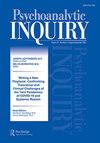我们的文学生活
IF 0.5
4区 心理学
Q3 PSYCHOLOGY, PSYCHOANALYSIS
引用次数: 0
摘要
本文追溯了文学理论的演变,从20世纪70年代开始,它从新批评主义转向读者反应理论,在新批评主义中,文本脱离了读者的生活,读者反应理论鼓励读者在他们所读的东西中看到自己。我认为这种阅读理论让我们意识到文学是如何帮助我们塑造连贯的自我的。我举了三个例子——《圣经》、莎士比亚和某些19世纪的小说——来证明,伟大的文学之所以伟大,是因为它提供了我们做好这件事所需的材料。本文章由计算机程序翻译,如有差异,请以英文原文为准。
Our Lives in Literature
ABSTRACT The article traces the evolution of literary theory, beginning in the 1970s when it moved away from the New Criticism that saw the text as removed from the life of its readers toward Reader-Response Theory, where readers are encouraged to see themselves in what they read. I argue that this theory of reading leads to an awareness of how literature helps us fashion a coherent self. I use three examples – the Bible, Shakespeare, and certain nineteenth-century novels – to argue that great literature is great because it gives us the material we need to do this well.
求助全文
通过发布文献求助,成功后即可免费获取论文全文。
去求助
来源期刊

Psychoanalytic Inquiry
PSYCHOLOGY, PSYCHOANALYSIS-
CiteScore
1.00
自引率
33.30%
发文量
65
期刊介绍:
Now published five times a year, Psychoanalytic Inquiry (PI) retains distinction in the world of clinical publishing as a genuinely monographic journal. By dedicating each issue to a single topic, PI achieves a depth of coverage unique to the journal format; by virtue of the topical focus of each issue, it functions as a monograph series covering the most timely issues - theoretical, clinical, developmental , and institutional - before the field. Recent issues, focusing on Unconscious Communication, OCD, Movement and and Body Experience in Exploratory Therapy, Objct Relations, and Motivation, have found an appreciative readership among analysts, psychiatrists, clinical psychologists and a broad range of scholars in the humanities.
 求助内容:
求助内容: 应助结果提醒方式:
应助结果提醒方式:


